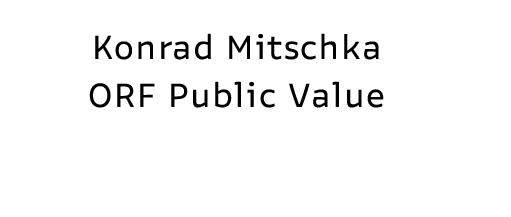Back to overview
Konrad Mitschka
Expert Panels

How does ORF know what Public Service Media quality should look like? How can he identify challenges caused by the dynamic transformation of media? How will he be aware of demands
and expectations?
Expert panels within the framework of ORF Quality Assurance System
provide an answer to these questions. The focus lies on external expertise:
What are the perspectives of the science community? What do media experts
demand? What do ORF's stakeholders expect? To find out, ORF organizes a
series of "Expert Panels". This are a moderated workshops to increase the dialogue
between programme representatives and experts in the relevant field.
The expertise and opinions of experts involved in the respective topic are thus
given broader scope.
Every year, the program genre of information, culture/religion, sports, entertainment and science/education/service are on the basis of the requirements
of ORF's core mission and ORF's programming guidelines and reviewed by
means of external reflection. The "Expert Panels" are organized by ORF's Public
Value Competence Center, in cooperation with the relevant ORF editorial departments. This ensures that participants are chosen based on research and
editorial expertise, available publications, and relevant competence. In order
to take into account the heterogeneity of the external perspective, various new
scientists and experts are invited. Responsible senior editors from the editorial
offices take part in the discussion. Following an analysis of the weaknesses and
strengths of the media content, the focus is on the expectations of the experts.
Criticism and expectations inevitably result in a demanding reflection on media
quality, which, due to the length of the discussions, often last several hours
and are conducted in specific working groups. The central point of reference
in the experts' discussions is ORF's fulfillment of its public service mission.
The Public Value quality dimensions and performance categories are used
for this purpose. To incorporate the changes due to digital transformation,
young people are invited, which should enable current and often provocative
objections and demands to be considered.
Complementary, in 2022, a "Future Dialogue - Generation Z" was held specifically
for this purpose with young people from all over Austria. Members of
the ORF management and journalists of the specific program departments
participated to establish an respectful atmosphere of direct contact. In the last
third of the discussions, the expectations of the experts have been addressed
in order to take a look at future quality media production. The aim of these
stakeholder events is to develop a future oriented profile of requirements that
will help ORF meet expected challenges.
From ORF's point of view, previous experience of the "Expert Panels" has
shown that they represent a competent reflection of ORF's media production,
enabling quality control of existing services and at the same time orientation for the future. Since broadcasting managers and editors from the respective
programme areas are also invited to these talks, a direct, discursive exchange
between media practice and media criticism is created. Since the start of these workshop ORF managers and journalists had the opportunity to contact over a hundred experts from various disciplines. Religion was just as much a topic as, for example, culture, sports, or entertainment. Young media users were able to raise their voices just as much as those responsible for various civil society institutions. Leading scientists, successful Austrian creatives and representatives of the younger generation were all able to make their voices heard in these discussions. ORF will continue to pursue this path of cooperation, of workshops focusing on quality, to secure its role as a relevant medium supporting citizenship, society and democracy, making sure, that ORF is capable to fulfill its obligations, its public service remit in the future.



